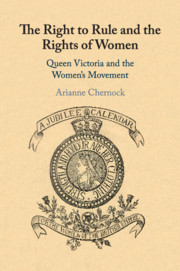Description
The Right to Rule and the Rights of Women
Queen Victoria and the Women's Movement
Author: Chernock Arianne
Reveals Queen Victoria as a ruler who captivated feminist activists - with profound consequences for nineteenth-century culture and politics.
Language: English
Subject for The Right to Rule and the Rights of Women:
The Right to Rule and the Rights of Women
Publication date: 08-2020
Support: Print on demand
Publication date: 08-2020
Support: Print on demand
The Right to Rule and the Rights of Women in Victorian Britain
Publication date: 08-2019
260 p. · 15.8x23.5 cm · Hardback
Publication date: 08-2019
260 p. · 15.8x23.5 cm · Hardback
Description
/li>Contents
/li>Biography
/li>
Queen Victoria is often cast as a foe of the women's movement - the sovereign who famously declared women's rights to be a 'mad, wicked folly'. Yet these words weren't circulated publicly until after the Queen's death in 1901. Beginning with this insight, this book reveals Victoria as a ruler who captured the imaginations of nineteenth-century feminists. Women's rights activists routinely used Victoria to assert their own claims to citizenship. So popular was their strategy that it even motivated anti-suffragists to launch their own campaign to distance Queen Victoria from feminist initiatives. In highlighting these exchanges, this book draws attention to the intricate and often overlooked connections between the histories of women, the monarchy, and the state. In the process, it sheds light on the development of constitutional monarchy, concepts of female leadership, and the powerful role that the Crown - and queens specifically - have played in modern British culture and politics.
List of figures; Acknowledgments; Introduction: a mad, wicked folly?; 1. The radicalism of female rule in eighteenth-century Britain; 2. 'An argument of a very popular character': Queen Victoria in the early women's movement, c. 1832–76; 3. Rethinking the 'right to rule' in Victorian Britain; 4. The anti-suffragists' Queen; 5. 'No more fitting commemoration'?: Reclaiming Victoria for the women's movement during the Golden and Diamond Jubilees; Conclusion: Queen Victoria versus the suffragettes: the politics of queenship in Edwardian Britain; A note on sources; Bibliography; Index.
Arianne Chernock is Associate Professor in the Department of History at Boston University. Her first book, Men and the Making of Modern British Feminism (2010), was awarded the John Ben Snow Prize by the North American Conference on British Studies. She frequently contributes to print, television and radio outlets.
© 2024 LAVOISIER S.A.S.




